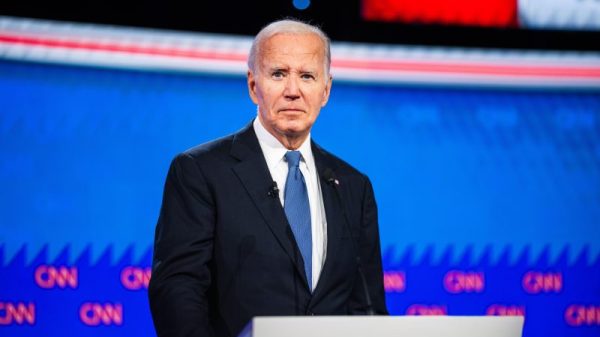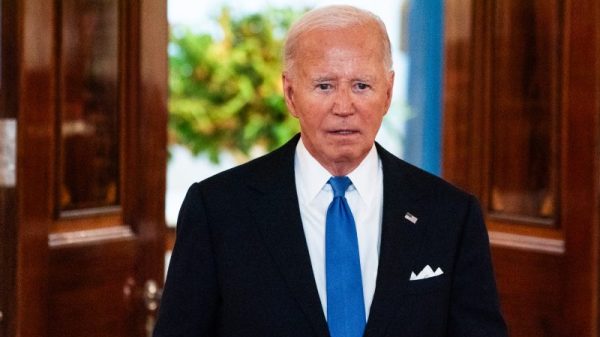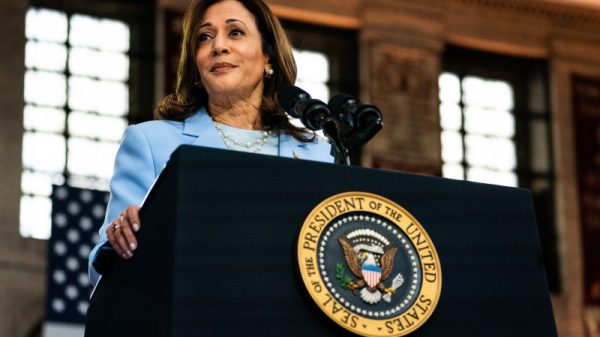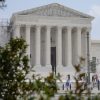Four decades before he was among the conservative Supreme Court justices who restricted the use of affirmative action in higher education, Clarence Thomas told staffers at the Equal Employment Opportunity Commission that “God only knows where I would be today” if not for the legal principles of equal employment opportunity measures such as affirmative action that are “critical to minorities and women in this society.”
“These laws and their proper application are all that stand between the first 17 years of my life and the second 17 years,” Thomas, then the EEOC chairman, said in 1983.
His comments were later cited in outlets including The Washington Post, the New York Times and Newsweek. A 2022 opinion piece in the National Review argued that Thomas had praised “the proper application of the laws” instead of affirmative action.
But Thomas has mostly criticized affirmative action, laws that consider race in school and the workplace. In 2013, the Supreme Court justice compared affirmative action to Jim Crow-era laws, saying that “educational benefits” were used as justification for both Jim Crow and affirmative action.
“The argument that educational benefits justify racial discrimination was advanced in support of racial segregation in the 1950’s, but emphatically rejected by this Court,” Thomas wrote in a concurring opinion in Fisher v. University of Texas, a 2013 case that called for a higher standard to be met when justifying affirmative action in an educational setting. “And just as the alleged educational benefits of segregation were insufficient to justify racial discrimination then … the alleged educational benefits of diversity cannot justify racial discrimination today.”
He added, “The University’s professed good intentions cannot excuse its outright racial discrimination any more than such intentions justified the now denounced arguments of slaveholders and segregationists.”
Thomas’s many public statements and opinions on affirmative action before and during his time on the Supreme Court have been reexamined after Thursday’s rulings on race-conscious admissions programs at Harvard and the University of North Carolina (UNC). Thomas joined the court’s conservative majority in ruling that Harvard and UNC violated the Constitution’s guarantee of equal protection. In ruling that “the student must be treated based on his or her experiences as an individual — not on the basis of race,” the Supreme Court’s decisions in Students for Fair Admissions v. University of North Carolina and Students for Fair Admissions v. President and Fellows of Harvard College will force a dramatic change in how the nation’s private and public universities select their students.
After Thomas read his concurring opinion denouncing universities’ use of affirmative action in admissions as “rudderless,” Justice Ketanji Brown Jackson — the only other Black justice and one of the court’s most liberal members — described Thomas’s words as part of his “prolonged attack” on affirmative action.
“With let-them-eat-cake obliviousness, today, the majority pulls the ripcord and announces ‘colorblindness for all’ by legal fiat,” Jackson wrote. “But deeming race irrelevant in law does not make it so in life.”
Thomas first gained recognition as a lawyer and assistant to then-Sen. John Danforth (R-Mo.) and was described in The Post in 1980 as “a long-time supporter of Ronald Reagan, opposed to the minimum wage law, rent control, busing and affirmative action.” He told The Post that attending college and law school with White classmates who believed he was there only because of his race was the worst experience of his life. When Thomas was accepted to Yale Law School in 1971, Yale’s goal was to have 10 percent of its incoming class be students of color, according to PBS.
“You had to prove yourself every day because the presumption was that you were dumb and didn’t deserve to be there on merit,” Thomas said to The Post in December 1980.
John Bolton, a former national security adviser in the Trump administration and a classmate of Thomas’s at Yale, told PBS that he thought Thomas believed that “people assumed he was there as a beneficiary of affirmative action, and it grated on him.”
That feeling followed Thomas into his professional career; he has said that he avoided working on any issue directly related to Black people because of his belief that colleagues thought he had the job only because of his race.
“If I ever went to work for the EEOC or did anything directly connected with Blacks, my career would be irreparably ruined,” he said at the time. Less than two years later, in 1982, Reagan appointed Thomas as the chairman of the EEOC.
Thomas noted in his 1983 speech that while “too much posturing has taken place on issues such as affirmative action,” lingering problems surrounding equal employment opportunity for minorities and women needed to be solved.
“For the most part, they must be solved by applying legal principles of paramount importance to me,” he said. “But for them, God only knows where I would be today.”
After giving his brief praise, he noted his abhorrence for anyone who would “twist, bend or distort” laws such as affirmative action, “whether such distortions are said to help or hurt minorities or women.”
During his time on the Supreme Court, Thomas has repeatedly said in cases that the equal protection clause of the 14th Amendment bars the consideration of race, including race-based affirmative action. (The amendment says, “Nor shall any State … deny to any person within its jurisdiction the equal protection of the laws.”)
In his dissent in Grutter v. Bollinger, the landmark 2003 case on affirmative action in student admissions, Thomas quoted Justice John Harlan’s dissent in the Plessy v. Ferguson case that ushered in the era of Jim Crow: “Our Constitution is colorblind, and neither knows nor tolerates classes among citizens.”
Ten years later, Thomas went one step further and compared the affirmative-action policies presented in Fisher to Jim Crow-era segregationists, arguing that the University of Texas’s “racial tinkering” ultimately harmed the people it was designed to help.
“The worst forms of racial discrimination in this Nation have always been accompanied by straight-faced representations that discrimination helped minorities,” he wrote in his concurring opinion. “I think the lesson of history is clear enough: Racial discrimination is never benign.”
A second version of Fisher returned to the Supreme Court in 2016, as the court reaffirmed that the value of creating a diverse student body allowed university officials to consider race in making admission decisions. In his dissent, Thomas reiterated that the state’s use of race-based admissions is “categorically prohibited” by the Constitution, saying it was a “faddish theory that racial discrimination may produce ‘educational benefits.’”





























